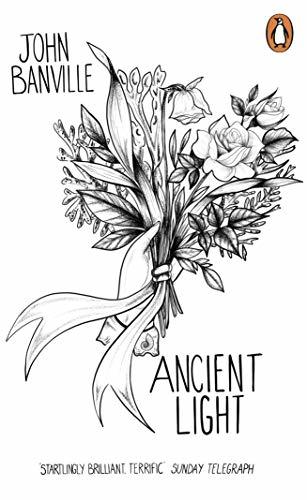What do you think?
Rate this book


245 pages, Paperback
First published January 1, 2012
More confusingly still, there was another mirror, a full-length one, fixed to what would have to have been the outwards-facing side of the inwards-opening door, and it was in this mirror that I saw the room reflected, with at its centre the dressing-table, or whatever it was, with its own mirror, or I should say mirrors. What I had, therefore, was not, strictly speaking, a view of the bathroom, or bedroom, but a reflection of it, and of Mrs Gray not a reflection but a reflection of a reflection.
Nor did she care for the plangent, plunging love stories that were still so popular then, the women all shoulder-pads and lipstick and the men either craven or treacherous or both…
Since it seems that nothing in creation is ever destroyed, only disassembled and dispersed, might not the same be true of individual consciousness? Where when we die does it go to, all that we have been? When I think of those whom I have loved and lost I am as one wandering among eyeless statues in a garden at nightfall. The air about me is murmurous with absences.

There are moments, infrequent though marked, when it seems that by some tiny shift or lapse in time I have become misplaced, have outstripped or lagged behind myself...And for that moment I am helpless, so much so that I imagine I will not be able to move on to the next place, or go back to the place where I was before--that I will not be able to stir at all, but will have to remain there, sunk in perplexity, mired in this incomprehensible fermata.
It was as if I had been strolling unconcernedly along an unfamiliar, pleasant street when suddenly a door had been flung open and I had been seized by the scruff and hauled unceremoniously not into a strange place but a place that I knew all too well and had thought I would never be made to enter again.
this vast invisible sea of weightless and transparent stuff, present everywhere, undetected, through which we move, unsuspecting swimmers, and which moves through us, a silent, secret essence…the ancient light of galaxies…and so it is that everywhere we look, everywhere, we are looking into the past.
"What I have described is what appears in my memory's eye, and I must say what I see."
"Had I been simply a diversion, a plaything of the moment, to be toyed with by a bored housewife in the dull middle of an ordinary afternoon and then unceremoneously sent packing, while she turned back to the business of being who she really was and forgot all about me and the transfigured creatures we had both seemed to be when she was thrashing in my arms and crying out in ecstasy."
"That is how it is, when one discovers oneself through another...
"For me she could have no past that was not a fable, for had I not invented her, conjured her out of nothing but the mad desires of my heart..."

"...the sky must be visible at the top of a window viewed from the base of the opposite wall, if memory serves..."
"...the past is a luminous and everlasting present; alive to me yet lost, except in the frail afterworld of these words..."
"Now he was speaking of the ancient light of galaxies that travels for a million - a billion - a trillion! - miles to reach us.
"Even here, at this table, the light that is the image of my eyes takes time, a tiny time, infinitesimal, yet time, to reach your eyes, and so it is that everywhere we look, everywhere, we are looking into the past."
I tried to make out the lights of Portovenere across the bay but could not for those great flocks of whiteness hosting haphazard in the brumous air.Come again—? Yet think about it for a moment, perhaps even look up "brumous" (like other Banville words such as "tundish," "leporine," or "mephitic"), and the description actually seems remarkably good. But writing like this gives the reader a dilemma: you either have to pause to suck the juice out of each of his nectared phrases, or continue in a perfumed haze of half-understanding; though familiar from poetry, neither is the usual posture in which to read a novel.
Mrs. Gray in the mirror, in the mirrored mirror, was naked. It would have been more gallant to say she was nude, I know, but naked is the word. After the first instant of confusion and shock I was struck by the grainy look of her skin—I suppose she must have had gooseflesh, standing there—and by the dull glimmer of it, like the sheen on a tarnished knife-blade. Instead of the shades of pink and peach that I would have expected—Rubens has a lot to answer for—her body displayed, disconcertingly, a range of mottled tints from magnesium white to silver and tin, a scumbled sort of yellow, pale ochre, and even in places a faint greenishness and, in the hollows, a shadowing of mossy mauve.Again, a wonderfully wrought, exquisitely precise description. But not that of a fifteen-year-old boy. This is a man who has made a lifetime's study of the language of art, applying it now to something in his distant past. In all his descriptions of their lovemaking (and he is not reticent), he combines the sensuous language of an aging connoisseur with knowing mythological references to "the Lady Venus and her sportive boy." Can it have been real? I do not trust Cleave's character now (he is an actor after all), I cannot believe his reconstruction of his younger self at all, and Mrs. Gray mostly seems the figment of masturbatory fantasy. One revelation at the novel's end takes away some of the unlikeliness, but it comes too late. One meaning of the novel's title Ancient Light is that "everywhere we look, everywhere, we are looking into the past." And it is no coincidence that the title of the movie is The Invention of the Past. The reshaping of life is what a novelist does, and it may be the connecting theme of the book, as Cleave reworks or even invents memories of Mrs. Gray as a way to exorcise the death of his daughter, and finding perhaps some platonic parallels in his relationship with Dawn Davenport. You could see Paul Auster doing something quite similar, but with much greater economy and less blatant self-indulgence. Banville is a master of language—of that there is no doubt—but I wish he would apply it to something with greater relevance to the real world.

"Quem iria eu amar agora, e quem iria amar-me?
Um mundo acabava sem um só ruído."